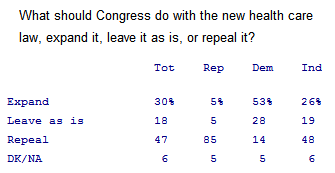
WASHINGTON -- While most polls show that Americans' main concern at the moment is the economy, a considerable chunk of the political discourse remains focused on the health care bill Congress passed in March. Many Republicans have spoken out in favor of repealing the bill. Democrats seem less concerned about a repeal actually passing than about the battle that will play out in the media.
Since the midterms, Republicans have used the "mandate" narrative to justify a wide variety of proposals, including health care bill repeal. This is not surprising. Any election resulting in a significant shift of power launches a similar discussion: Should politicians interpret the outcome as an implicit authorization of -- perhaps even a demand for -- the victors' policies? But, if the majority of voters delivered any such mandate this year, it probably had nothing to do with health care. Recent polls do not show a consensus opinion regarding the bill or its repeal.
The public appears to express roughly even levels of support for repealing or not repealing the bill. However, the bulk of the support in each direction comes from partisans on both sides. A McClatchy-Marist poll released yesterday shows division along familiar lines:
On the side favoring it, 16 percent of registered voters want to let it stand as is.
Another 35 percent want to change it to do more. Among groups with pluralities who want to expand it: women, minorities, people younger than 45, Democrats, liberals, Northeasterners and those making less than $50,000 a year.Lining up against the law, 11 percent want to amend it to rein it in.
Another 33 percent want to repeal it.Among groups with pluralities favoring repeal: men, whites, those older than 45, those making more than $50,000 annually, conservatives, Republicans and tea party supporters.
Independents, who swung to the Republicans in the Nov. 2 elections, are evenly divided on how to handle the health care law, with 36 percent for repealing it and 12 percent for restraining it -- a total of 48 percent negative -- while 34 percent want to expand it and 14 percent want to leave it as is -- also totaling 48 percent.
Quinnipiac University found a similar breakdown in a national poll released last week:
Rasmussen's November 19-20 survey found a higher level of support for repeal (57%), but America is clearly not of one mind. At least, not on the new health care bill. Gallup's annual Health and Health Care survey finds that the majority of Americans consider the quality of their health care "good" or "excellent" -- even among those without insurance:

In general, Americans find the quality of their health care satisfactory. If voters delivered a mandate for anything a few weeks ago, it was for politicians to direct their attention elsewhere.

